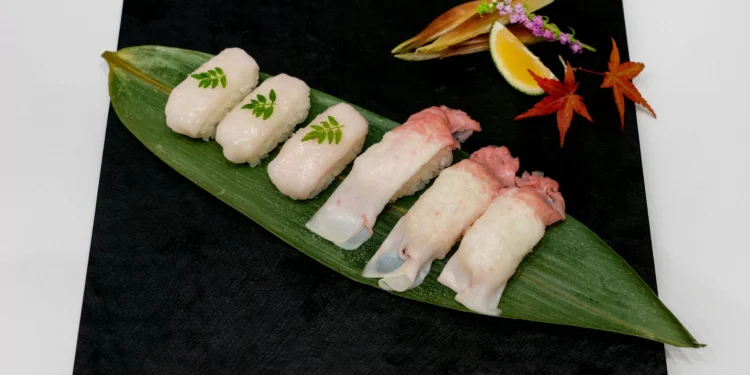Bite-size portions of fin whale were available to sniff and taste as Japan’s whaling industry seeks to rekindle an appetite for a traditional protein source that has fallen out of favor in recent years.
For centuries, whale meat has been a staple in Japanese cuisine, with the country’s whaling industry providing a vital source of food and income. However, in recent decades, the consumption of whale meat has declined significantly due to changing tastes and international pressure to end commercial whaling.
But now, with a new generation of Japanese consumers showing interest in traditional foods and a growing demand for sustainable protein sources, the whaling industry is hoping for a revival.
At a recent event in Tokyo, visitors were invited to sample bite-size portions of fin whale, one of the most commonly hunted species in Japan. The meat was served in various forms, including sashimi, grilled, and in a hot pot, showcasing its versatility and potential as a culinary ingredient.
Many attendees were pleasantly surprised by the taste and texture of the fin whale meat, describing it as tender, flavorful, and similar to beef. Some even expressed a desire to incorporate it into their regular diet.
But beyond the taste, there is a deeper cultural significance to the consumption of whale meat in Japan. For many, it is a symbol of tradition and a connection to their ancestors. As one attendee put it, “Whale meat is a part of our heritage and should not be forgotten.”
The event was organized by the Japan Whaling Association, which represents the country’s whaling industry. According to the association’s chairman, Yoshifumi Kai, the goal is to educate the public about the nutritional and cultural value of whale meat and to dispel any misconceptions about the industry.
Kai emphasized that Japan’s whaling practices are sustainable and strictly regulated, with only a limited number of whales caught each year. He also pointed out that the industry provides jobs and supports local economies in coastal communities.
The event comes at a crucial time for Japan’s whaling industry, as the country recently resumed commercial whaling after a 31-year hiatus. This decision was met with criticism from some international organizations, but it has also been welcomed by many in Japan who see it as a way to preserve their cultural heritage.
The resumption of commercial whaling has also sparked a renewed interest in whale meat among Japanese consumers. In fact, a recent survey by the Japan Whaling Association found that 70% of respondents were in favor of the industry’s revival.
But the industry still faces challenges, including a declining demand for whale meat and a shrinking market. To address this, the Japan Whaling Association is exploring new ways to promote and market whale meat, such as partnering with restaurants and retailers to offer it as a specialty item.
The association is also working to change the perception of whale meat as a luxury item and instead position it as an affordable and sustainable protein source. This is especially important as Japan faces a growing demand for protein alternatives due to concerns about the environmental impact of meat production.
In addition to promoting whale meat domestically, the Japan Whaling Association is also looking to expand its market overseas. With the recent lifting of a ban on commercial whaling by the International Whaling Commission, there is now an opportunity to export whale meat to other countries.
The event in Tokyo was just the beginning of the industry’s efforts to rekindle an appetite for whale meat. The Japan Whaling Association plans to hold similar events in other cities and continue to educate the public about the nutritional and cultural value of this traditional protein source.
As Japan’s whaling industry seeks to regain its footing, it is clear that there is a growing interest and appreciation for whale meat among the country’s consumers. With a renewed focus on sustainability and a changing perception of traditional foods, the industry may just have a chance at a successful revival.






